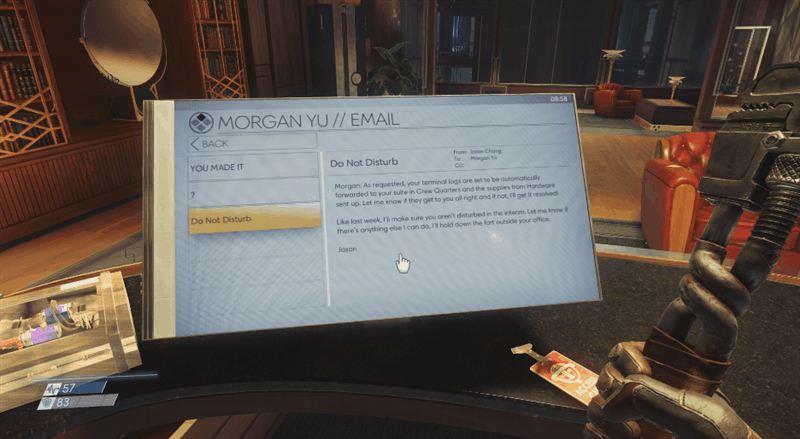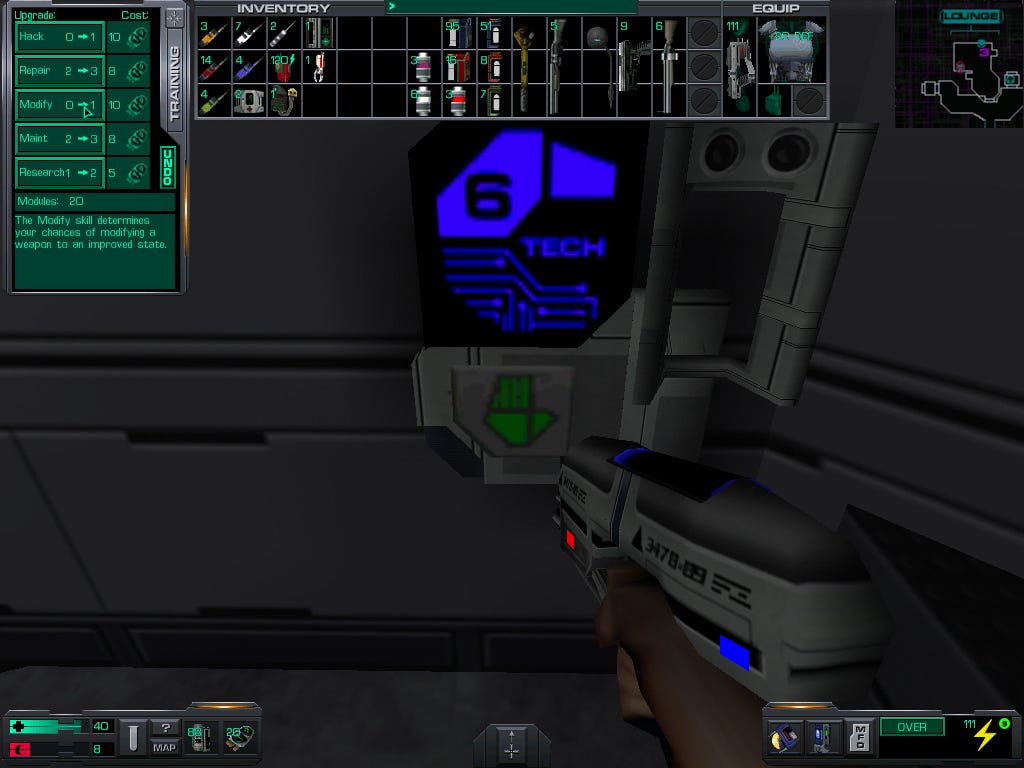System Shock 2 Weapon Degradation
I'm very mechanical and in my mind every tool is subject to wear and eventual uselessness. I only wish games would get into what types of wear more. I may be incorrect, but I remember demos souls imparting wear on your weapon when striking walls, which would be a graceful way to expand on weapon-wear mechanics.Irl, a good tool can wear very long when used for one purpose but break quickly when used for other purposes.
Energy weapons are maintenance free; exotic weapons degradation per shot is greatly reduced. Weapons can and will jam at all condition levels (thanks to Rainalkar for the idea) 10. Slight reduction to wrench damage. Reduced shotgun strength requirements by 1, altered string. System Shock 2 s missing log One of the most controversial design decisions in Shock 2, says designer Dorian Hart, was to have the weapons degrade with use, and so be in regular need of repair. Antares autotune fl studio 12 free download. From a pure design standpoint, the goal was to ratchet up the feeling of constant tension. I would like to play one of the greatest games of all time (besides HL1:P) Where could i get to play System Shock 1 and 2? I have Windows XP, what that create a problem? Thanks!Greenday5494 22:45, 6 June 2007 (UTC) First of all, this page is for discussing issues on the System Shock 2 page only.
System Shock 2 Heavy Weapons Build

So imagine a game where you could pry open doors and such with your sword at the risk of breaking the blade.Some game do this mechanic poorly, but overall I like it. I've never minded it. Usually gives me incentive to use other weapons instead of sticking to the same Super Fire Sword +18 because it's simply the best.I do think it is honestly done well in Shadow of Rome though. In that game-much like it's loose successor, Dead Rising-weapons really are supposed to be power-ups. They're made to be picked up and used swiftly as limited resources to give yourself an advantage over the other gladiators. You can even chuck them at people.
You perform different gladiatorial feats to earn favor with the crowd so that they'll throw down more-and more powerful-weapons.There's a cheat for making weapons unbreakable, but it kind of dulls the experience, no pun intended. Still the worst part of the game, it should tell you how much I like that game. It's a minor thing but I don't like it, it brings nothing to the table, it's just there to make you pause the game, use a repair kit, or go to a blacksmith/armorsmith, whatever and waste gold/time. It adds nothing to the game, and it's when this system is used like this that it sucks, it simply should not be there imo.Muramasa and Monster Hunter, for example, make a different use of it and do it faily well, but games like Witcher 3 and Fallout 3 make it boring imo. It's not 'broken as hell' in DS2. It's actually the best version of it in any of the games, because of the way it forces you to experiment and play around with the utterly vast weapon sets the game has (loodborne is a marked step back from this). The game gave you an extra item slot per hand for a reason, guys.
The only legit complaint I see with it is that when the game launched it had borked 60FPS support by tying degredation to framerate (the fuck?), which was finally fixed in Scholar.In DS1 I used like 1-2 weapons the entire game. In bloodborne, I basically used one until I got so bored with the game I started using a wiki to find more weapons. In DS2, I rotated like 7 weapons. It's acceptable in SRPGs, though I prefer if it is absent. In all other games I think it's an inacceptable junk mechanic. Degrading shields (and crafting, leave the simulation stuff out of all games I want to play please:/) is the worst part of Skyward Sword, which I love otherwise.

It can really hamper my enjoyment of a game a lot. Typically my solution to that is to never use stuff that degrades if it is possible (for instance, I did not use the shield in Zelda SS other than when it was abolutely neccessary) or, if that is not possible, to always choose the cheapest / easiest to get weapon. In Fire Emblem, I still carry iron swords into the final battle, though right before the battle starts I take out all my stronger weapons which then I cannot use up anyway of course. I think it works well in Fire Emblem, Monster Hunter, and Fallout Mew Vegas because it creates an interesting mechanic or strategy for the player.Fire Emblem causes a meta layer of strategy, you only get a few really good swords per playthrough, so save that for the big bosses.In monster hunter it lends to the flow of combat, I know you want to get in there but your weapons dull, you'll need to sharpen to do danger so give yourself a seconds to do that and heal. It adds tension. Monster Hunter is a game about spacing, distance, and reacting to the enemy.
The weapon degradation lends itself to this.New Vegas and Fallout 3 let you role play as a scavenger, and with a good repair skill you are slapping 2 guns together to make a better quality gun, so if you find dupes don't worry, it can still be useful. Like most mechanics, it can be quite useful and provide several pacing, thematic, and strategic benefits to a game design. Also like most mechanics, the problem tends to be that inexperienced designers assume it provides these benefits automatically, which is not the case.Just putting 'durability' mechanics into a game in a vacuum, without considering how it influences the rest of the game design, is what creates significant problems. This is usually done out of a misguided desire for 'realism', which tends to be the sort of thing that inexperienced designers put too much faith in, in general.
(Veteran designers tend to realize that 'verisimilitude' is actually the thing they want.)Let's take MGSV, for example. You do have weapon durability-your silencer/suppressor degrades-but it isn't universal.

If you wanted to be 'realistc', it should be; most firearms do suffer significant loss of reliability if they aren't cleaned relatively thoroughly after heavy use, especially if they're given time to 'cool' between uses. There wouldn't be much gameplay benefit to that, though; you already have the ammunition and resupply system there, weapon durability would just be one extra fiddly little bit on top of it annoying the player.So, why do suppressors get limited shots? Because the designers identified that players of MGS games had often come to equate 'stealth' with 'just shoot everyone, but do it with a silenced weapon'. The AI tech still isn't quite advanced enough to deal with this in a realistic way ('Hey Yuri, have you noticed none of the other guards seem to be patrolling anymore and no one's talking on the radios?' ), so the suppressor durability is kind of a stop-gap solution: it's meant to make you consider whether or not it's worth KOing every guard, and hopefully sometimes bait you into leaving a few awake and trying to sneak around them instead, because you're too deeply infiltrated to want to resupply.
Because resource management is fun and adds depth to games.Unfortunately, most games just require you do go to the blacksmith and hand over some money to repair your weapons. When a game used a near infinite resource to repair weapons, degradation can become pointless busy work. Especially if you run into blacksmiths frequently enough that weapons breaking is very unlikely. If a game has fast travel it can trivialize it even further, since you can go fix your weapons at any time.Games that use very limited resources to repair weapons are far better. It encourages active management and rotation of your weapons, and makes looting actually useful since there are resources you need to find.System Shock 2 is a good example, where repair kits are rare for the fist part of the game, but you can find way too many of them later on. Fallout 3 also had a pretty good implementation where you needed to find similar weapons to repair them. It's a damn shame F4 took it out in its mass 'streamlining.'
Games usually handle this in one of two ways:Either weapon degradation is so slow it's meaningless (see: Dark Souls)Or it has meaning and is incredibly annoying. (See: Dead Island)It could have meaning if a weapon is really something special in the game (in games like Day Z for exmaple) but otherwise it's just annoying.
Either make it super meaningful, build the game around it, do something interesting with it or don't put it in there at all.I like Dying Light, but what was the point of the weapon degradation? It just meant that I couldn't use a weapon I like after some time, but there were always hundreds of other weapons around, I just didn't like them that much. So what's the point? Well, it's thematically appropriate in a Souls title, for example, where the entire game is things that are ancient and rotting and decaying away.As for games that do it best, I.guess Monster Hunter? They don't break the actual weapon, they just do less damage and don't penetrate as well the more you use them and you have to use a grindstone on the weapon. Since the weapon bounces off of the enemy's hide because it's not sharp enough to pierce it or whatever after hammering it against scales for a while, it makes sense.